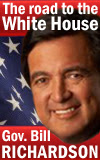 State Sen. Leonard “Lee” Rawson, R-Las Cruces, has asked the attorney general for an opinion on whether Gov. Bill Richardson can legally raise funds for a presidential campaign while the Legislature is in session.
State Sen. Leonard “Lee” Rawson, R-Las Cruces, has asked the attorney general for an opinion on whether Gov. Bill Richardson can legally raise funds for a presidential campaign while the Legislature is in session.
In a letter sent Tuesday to Attorney General Gary King, Rawson asked whether a law that prohibits the governor from soliciting contributions for a “political purpose” from Jan. 1 until 20 days after the end of the session applies to
The same law prohibits lawmakers from soliciting funds from Jan. 1 to the end of the session and prohibits lobbyists from contributing to such campaigns during those time periods. The intent, Rawson said, is to prevent political contributions from having an effect on decisions made by lawmakers and the governor.

At issue is a 2003 amendment to state law that defines “political purpose” as “influencing or attempting to influence an election” and defines election as “any primary, general or statewide special election in
Rawson asks in the letter whether
“It is clear that the prohibition applies only to state elections and does not apply to candidates seeking federal office,” Shipley said. “This is an obvious and not unexpected political attack from Senator Rawson. Is it ethical for him to use his official state office and state resources to sling political mud?”
Rawson said Shipley’s argument is “pretty weak,” pointing out that the state has some jurisdiction over the regulation of federal elections in
Rawson said there’s a deeper question that should be asked. It wouldn’t be a big deal if
“Legal or illegal, is it ethical? Rawson asked. “When you have Legislation dealing with industry coming up, I really wonder. … You know it has an effect.”
It’s not unusual for the attorney general’s office to take months to respond to a request for a legal opinion. This will be the first test of King’s ability to be independent of the governor, a fellow Democrat.
Rawson, who served in the Legislature with King for many years, said he has no doubt about that.
“I think
A prior version of this posting did not clearly communicate Rawson’s concerns about donations from people tied to corporate interests.